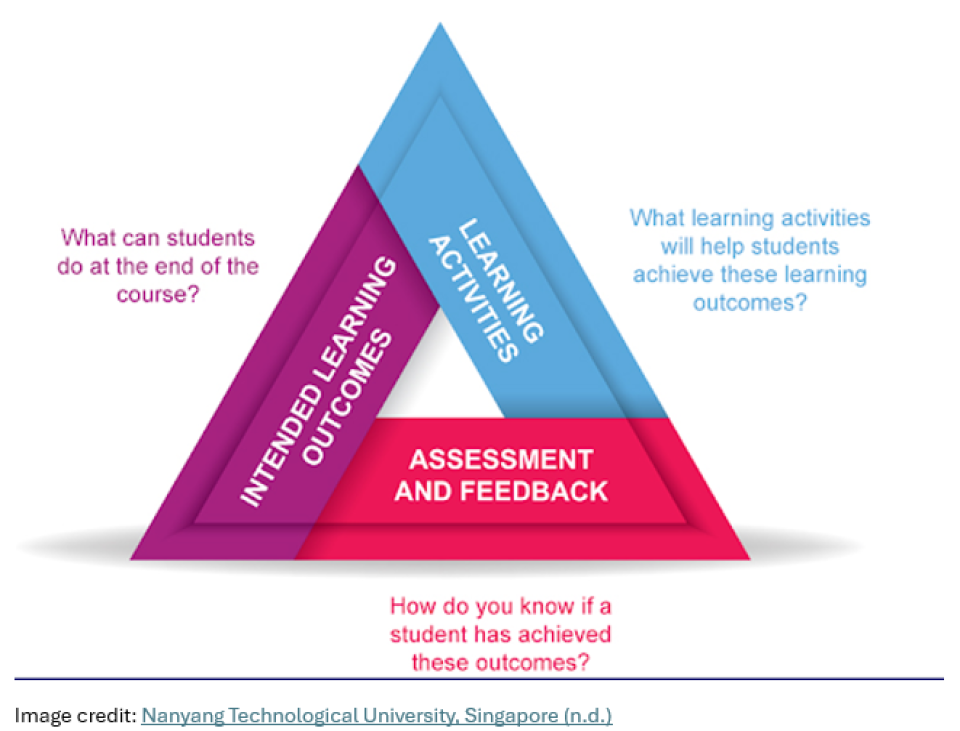
Curriculum Design: Process & Resources
What is Curriculum Design?
Curriculum design (CD) is a term used to describe the processes through which we create an effective and inclusive learning experience, or curriculum of study. It differs from the term ‘learning design’, which usually relates to designing smaller or shorter learning events. Learning design is part of CD, but there are broader considerations in terms of the student learning experience overall. Therefore CD usually relates to substantive learning design, often accredited learning, or learning which takes place within specific parameters, such as a course, module or programme. Approaches to curriculum design may be in relation to a specific module(s), or may take a programmatic approach, considering learning through the lens of the overall programme aims and desired graduate attributes or competencies.

Why do I need to understand curriculum design?
Whether you have your own approach to designing learning, or you’re new to learning design, curriculum design is often easier as a formal process, especially where you need oversight of many different learning events as part of one curriculum. Rapid change in the learning landscape, such as developments in Generative AI, may also require new approaches to how you design learning, especially assessment.
There are many processes, tools and frameworks to support your design process. By following formal peer-reviewed approaches, you can ensure you have fully considered each aspect of the learning journey, from the student experience to alignment with DCU strategy.
CD is most useful when you are tasked with designing learning such as:
- creation or accreditation of a new module or programme
- annual evaluation and redesign of programmes
- responding to student feedback and evaluation or reflecting on practice
- responding to changes in the teaching and learning landscape such as new technologies or global pandemics
- ensuring a programme team or module teams within a programme align
- ensuring parity of student experience across a programme or programmes
- ensuring learning is effective, inclusive, and accessible
- ensuring programmes involve suitable learning activities, content and assessment, or in other words, enhancing your practice and thereby the student experience.
Where should I start?

The theory of Constructive Alignment.
You may already have some processes or pedagogical theories in use, in which case, the next section will signpost you to relevant resources. If you’re new to curriculum design, we recommend learning about the theory of ‘constructive alignment’ (CA) in the first instance.
CA involves the following process: firstly, craft your learning outcomes, secondly, design authentic assessment methods to evidence the outcomes, thirdly, design learning activities through which students construct their own meanings in line with the intended outcomes, assessments, and graduate attributes. The full learning experience is aligned, and students are supported to develop and excel.
In the words of John Biggs, who coined the term CA in 1996, ‘’Learning is constructed by what activities the students carry out; learning is about what they do, not about what we teachers do. Likewise, assessment is about how well they achieve the intended outcomes, not about how well they report back to us what we have told them or what they have read.‘’ In other words, teaching is not an act of transmission of information as though pouring content from one bucket into another, but about understanding how students construct meaning from information, how they learn, and how this differs from student to student. CA is about designing student-centric education to support students to achieve the intended learning.
What are some useful resources to help me with CD?
The following resources are externally available and/or have been developed by the Teaching Enhancement Unit, with additional internal resources available to DCU staff via Loop. Staff should also consult their School and/or Faculty guidance, or speak to their Associate Dean for Teaching and Learning, for discipline-specific teaching and learning support.
The ABC learning design method was created at University College London in 2015 and takes a collaborative storyboarding approach to planning out curricula. For more information on DCU implementation of ABC workshops, click on the ABC Learning Design tab, including case studies of practice at DCU.
Academic integrity is a key graduate attribute, and the foundation of all learning in HE. Assessment design, the use of learning technologies, and education all affect the effectiveness of promoting and adhering to academic integrity. Visit our Promoting Academic Integrity page. DCU staff may also access the Academic Integrity Hub on Loop.
There are multiple resources related to assessment offered by the TEU, including Design of Assessment for Learning, Interactive Oral Assessment, Learning with ePortfolios, Student Partnership in Assessment, Guide to Assessment Rubrics (internal resource) and more. You may wish to visit our pages on Promoting Academic Integrity or the Teaching Enhancement Unit Podcast Series. DCU staff may access relevant resources on Loop, such as the Academic Integrity Hub or Loop Staff Support Hub.
Revised in 2001, Bloom’s Taxonomy is a frequently-referenced series of scaffolded thinking or learning stages, which helps with designing learning outcomes and activities. Try the Bloom’s Taxonomy website, or more accessible guide by Vanderbilt University or Arizona State University on combining Bloom’s with technology.
Challenge-based learning is about authentic learning based on real-world challenges, with defined stages to follow. Visit the DCU Challenge-Based Learning page to learn more. DCU staff may also access the CBL Hub on Loop.
Competency-based education is about designing programmes to develop student skills, knowledge, and attitudes towards real-world challenges and the future world of work. Learn more about the DCU Futures project.
For a short summary, see Biggs, J. (2003). Aligning Teaching for Constructing Learning, Advance HE publication. For broader approaches to learning design, try Biggs, J. B., & Tang, C. S. (2011). Teaching for quality learning at university : what the student does / John Biggs and Catherine Tang. (4th ed.). Open University Press. For a critique of CA implementation in HE, see Loughlin, C., Lygo-Baker, S., & Lindberg-Sand, Å. (2020). Reclaiming constructive alignment. European Journal of Higher Education, 11(2), 119–136. See also guides to Learning Outcomes and Assessment below. For a short video explaining CA, which may also be useful for students, try this short animated video from RMIT Vietnam.
DCU staff should be aware of relevant institutional strategies when designing learning. Visit the OVPAA website for relevant policy and regulations including the Programme Approval webpage, which may impact your timeline for programme design.
To situate curriculum design within the DCU ethos of teaching and learning, visit the DCU Strategy 2023-28, including the Teaching and Learning Strategy. DCU staff may also have Faculty guides available.
For staff new to teaching in the EU, the European Credit Transfer and Accumulation System underpins a lot of CD in terms of module weightings, expected student effort hours, and the importance of learning outcomes. The user guide is a good start: European Commission: Directorate-General for Education, Youth, Sport and Culture, ECTS users' guide 2015, Publications Office of the European Union, 2015.
Education for sustainable development is about DCU’s commitment to supporting our learners to develop the knowledge, skills, and attitudes required to become positive change agents. DCU staff may access the ESD Hub on Loop.
Graduate attributes are the characteristics you would like to see in successful graduates of your designed learning. These may be programme-based (in which case they are a good starting point for designing programme learning outcomes), institutional (see DCU Strategy) or national (for example, the skills statements produced by the Irish Universities Association).
TEU Guide to Learning Outcomes.
TEU Guide to Assessment Rubrics.
An important aspect of curriculum design, especially programmatic, is to engage with national expectations- matching learning expectations to the level of the programme. You can find relevant resources, including the Irish National Framework of Qualifications, on the Quality and Qualifications Ireland website.
The TEU offer many different modes of support with learning technologies used at DCU, from drop-in clinics and workshops to self-paced online resources like the Loop Staff Support Resource (internal resource only). See the Learning Technologies tab for more information.
Depending on the discipline and relevant professional body accreditation, mandatory programme content, assessment, and/or activities such as placements or labwork may influence curriculum design. Consult with your colleagues for specific information and advice.
When designing programme curricula, it’s important to consider recognition of prior learning, for example, how the learning outcomes might be evidenced in the workforce, or what your entry requirements to the programme are, and how these might be evidenced in different ways, including through non-formal and informal learning. See the DCU RPL webpage for guidance for staff, and the national RPL website.
Universal Design for Learning is about designing learning which is accessible to all learners from the outset, rather than relying on making revisions or workarounds when the need arises, ensuring a truly inclusive approach to education for all. Visit the DCU Universal Design in Education project and learn about the UDL Badge for DCU Staff.
Can you help me with CD?
Yes, you can request a workshop or support from the Teaching Enhancement Unit using our Consultancy Request Form. Alternatively, DCU staff are welcome to book in time with Academic Developer Dr Maeve O’Dwyer to discuss any questions about curriculum development and teaching and learning support.
